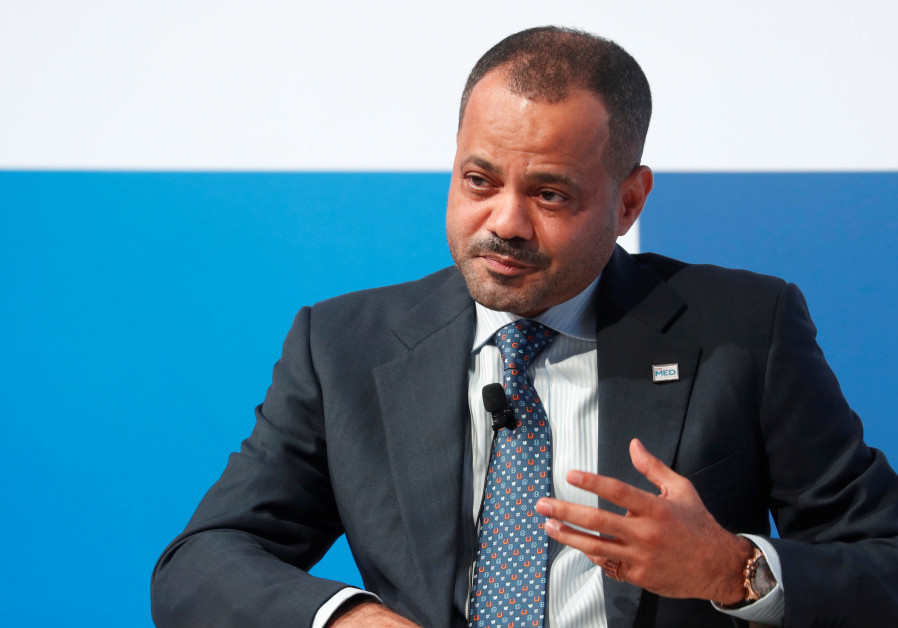Omani diplomat acknowledges Israel is a ‘fact of life in the Middle East’

Sayyid Badr bin Hamad Al Busaidi, secretary general of Oman’s at the Mediterranean summit MED 2018 in Italy November 22, 2018. (photo credit: REUTERS/MAX ROSSI)
Oman made its second public statement in support of normalized ties with Israel over the weekend, just days before the president of the Muslim-African country of Chad, Idriss Déby, made a historic visit to Israel on Sunday despite there being no diplomatic ties between the two countries.
“The Arab states need to come to terms with the reality that Israel is a fact of life in the region and as such it should share the rights as well as obligations,” said Oman’s Foreign Affairs Ministry Secretary-General, Sayyid Badr bin Hamad al-Busaidi.
He spoke at the fourth Mediterranean Dialogues in Rome, which drew leaders from all over that region, including Israel.
Just one month earlier, the Omani foreign minister made a similar statement at a secure summit in Bahrain. He spoke after Prime Minister Benjamin Netanyahu made a visit to Oman, which like Chad, had no diplomatic ties with Israel.
But as a sign of the slow shift in the region’s attitude toward Israel, Muslim leaders have become more open about their ties with the Jewish state and their reflections on the role it could have in the region.
Busaidi expressed his regret that Israel is not directly among those working to resolve the humanitarian crisis in Yemen.
“Israel is not directly involved but its voice can be influential,” Busaidi said.
He acknowledged that there had been some voices, particularly on social media, which expressed a hostile reaction to Netanyahu’s visit to his country.
“We are all part of one region and we have to come to terms with that reality. The only way to really reach a situation of a sustainable degree of stability is that we have to reach one another and talk and translate that talk into concrete action,” Busaidi said.
“It is good to turn an enemy into a friend,” he added.
Jordanian Foreign Minister Ayman Safadi, whose country already has a peace treaty with Israel, said the Arab world wanted relations with Israel.
But he cautioned that those ties had to be contingent on a two-state resolution to the Israeli-Palestinian conflict based on pre-1967 lines, with east Jerusalem as the capital of a Palestinian state as set in the Arab peace plan of 2002.
“Absent a fair solution to the Israeli-Palestinian conflict, the region will never have peace and stability,” said Safadi, who spoke on the same panel as Busaidi.
“The Arabs have come to terms with Israel being part of the region. The Arab Peace Initiative has been on the table since 2002. It’s not an ultimatum, it’s an invitation,” he said.
The United States, he said, is a critically important partner in any peace-making efforts between Israelis and Palestinians.
“Nothing can be done without the US,” said Safadi.
The Trump administration is scheduled to roll out its peace plan for Israel and the Palestinians in the near future, but no date has been set, and there are some reports that its publication has been delayed.
“We are ready to do the heavy lifting and to do our share in pursuing that [US-brokered] peace,” Safadi said. But he insisted that the only viable option is a two-state resolution.
The two men, along with Arab League Secretary-General Ahmed Aboul Gheit, also spoke about Iran and its nuclear threat.
Gheit said that he supported a nuclear-free Middle East and that both Iran and Israel should be required to meet that standard.
“Israel should also be treated equally when it comes to its nuclear capability,” Gheit said.
Join Jerusalem Post Premium Plus now for just $5 and upgrade your experience with an ads-free website and exclusive content. Click here>>






Comments are closed.